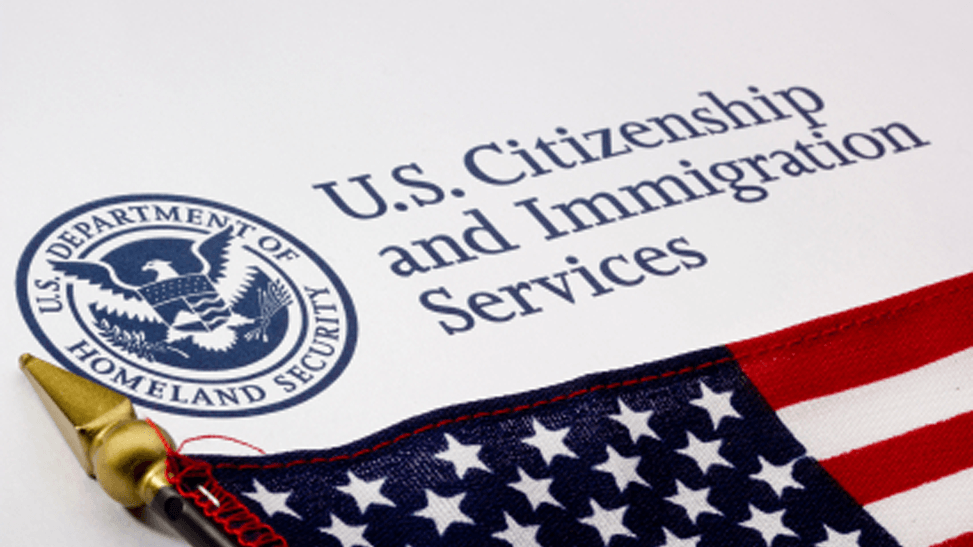Categories
Business
Family
Entertainment
Athletes
All Posts

On March 31, 2024, U.S. Citizenship and Immigration Services (USCIS) implemented a policy update that limits gender marker selections on all immigration forms and systems to two biological sexes: male and female. This change eliminates the option for applicants to select a non-binary or “X” gender marker—an option that had previously been permitted on some forms. While USCIS emphasizes that this update does not change who qualifies for immigration benefits, it may significantly impact how certain applications—particularly asylum claims based on gender identity-related persecution—are understood and evaluated. What Has Changed? Under the revised policy, applicants may now only choose “Male” or “Female” when completing USCIS forms. The ability to select a non-binary or third-gender option is no longer available. Applicants may still request to change their gender marker with USCIS, but only within the male/female binary. Supporting documentation, such as medical or legal records, is not required to make the change. This means that transgender individuals can still align their gender marker with their identity—if it falls within the two binary categories—but non-binary individuals are no longer represented. The change follows guidance issued by the federal Office of Management and Budget (OMB), which called for greater consistency in the collection of sex and gender data across federal agencies. Impact on Asylum Applicants This policy update is especially important for individuals applying for asylum based on persecution related to their gender identity. Under U.S. immigration law, asylum is available to people who have suffered persecution—or fear future persecution—based on their membership in a “particular social group.” This includes people targeted for being transgender, gender non-conforming, or otherwise not aligning with socially expected gender roles in their home country. Although the legal standard for asylum remains unchanged, the removal of the non-binary gender marker could make it harder for some applicants to clearly present and document their identity. In asylum cases, credibility and clarity are crucial. The ability to accurately reflect one’s gender identity on official forms can play an important role in establishing the foundation of a persecution claim. Now, applicants who identify as non-binary or outside the traditional male/female categories may be forced to select a gender that does not align with their lived experience. This could lead to confusion in their case file or require additional explanation during interviews or hearings. This policy could weaken the strength of some asylum claims—not because the underlying facts have changed, but because the official forms now fail to reflect the applicant’s true identity. For example: A non-binary person applying for asylum after being targeted in their home country may now have to select “Male” or “Female” on their asylum application, despite not identifying as either. This mismatch may lead adjudicators to question the applicant’s identity, possibly weakening the strength of the claim or requiring added clarification and documentation. In defensive asylum cases—where applicants are in removal proceedings—such inconsistencies could create unnecessary hurdles and complicate the evidentiary presentation. What Can Applicants Do? Despite the change, individuals can still pursue asylum based on gender identity. The underlying eligibility criteria remain the same. However, applicants should be prepared to clearly explain any differences between their stated identity and the gender marker required on USCIS forms. Applicants are encouraged to: Include a personal declaration explaining their gender identity in detail and how it relates to their fear of persecution. Provide evidence such as affidavits, country condition reports, or expert testimony that supports the claim. Work with an experienced immigration attorney who can help present the claim effectively and prepare for any questions that might arise from the new form limitations. The new USCIS policy on gender markers may seem like a technical update, but for asylum seekers fleeing gender-based persecution, it has real implications. While individuals are still legally eligible to seek protection, the limitation to binary gender options could make it more difficult to fully and clearly present their case. If you or someone you know is facing immigration challenges related to gender identity—or is concerned about how this policy may impact an asylum claim—please contact Santos Lloyd Law Firm to schedule a consultation with one of our experienced immigration attorneys. We’re here to help ensure your voice is heard and your case is handled with the care and expertise it deserves.

In 2025, the immigration landscape continues to shift under the weight of national security concerns, ushered in by Executive Order “ Protecting the United States From Foreign Terrorists and Other National Security and Public Safety Threats. ” This directive tasks federal agencies—including the U.S. Department of State—with implementing enhanced screening and vetting protocols for all foreign nationals seeking visas or other immigration benefits. The result? A dramatically intensified vetting process, along with mounting concerns from immigrants, attorneys, and civil liberties advocates alike. Traditionally, airport security focused on verifying travel documents and screening for prohibited items, while consular officers assessed the legitimacy of visa petitions and the admissibility of applicants. Extreme vetting, however, represents a significant shift toward a far more invasive and comprehensive investigative process. It now includes detailed background checks, biometric verification, digital forensics, and expansive scrutiny of an applicant’s online presence and criminal or financial records. Since President Trump’s second term began in January 2025, the implementation of extreme vetting has expanded rapidly. Today, border screenings go far beyond routine document checks, encompassing a full-scale evaluation of a traveler’s digital life. This pivot reflects the administration’s intensified focus on national security, but it has also triggered urgent discussions about privacy, due process, and the fairness of modern immigration enforcement. At U.S. ports of entry—especially airports—noncitizens are now subject to rigorous and invasive procedures, including: Inspection of cell phones, laptops, and other devices (including deleted content) Review of social media activity on platforms like TikTok, Instagram, and X (formerly Twitter) Biometric scanning, including fingerprinting and facial recognition These measures are no longer confined to travelers from high-risk countries. In practice, extreme vetting applies broadly across all nationalities, and increasingly affects lawful permanent residents as well. For noncitizens, this new landscape introduces a heightened level of uncertainty and vulnerability. Delays at U.S. consulates for visa issuance or renewal are becoming routine. Travelers must now be acutely aware of these changes, and those attending consular interviews or seeking visa renewals should be prepared to provide additional documentation verifying their maintenance of status, compliance with visa conditions, and the bona fide nature of their visa applications. It is critical to organize supporting materials in advance and be ready to answer questions about employment, education, travel history, and online activity. As the U.S. government continues to expand its use of data-driven risk assessment tools, travelers must adapt to a new normal, one where preparation is essential to navigating the immigration system without disruption.

For international business owners and entrepreneurs engaged in cross-border trade with the United States , the opportunity to expand operations and establish a physical presence in the U.S. may be more accessible than expected. The E-1 Treaty Trader Visa is specifically designed to facilitate this type of business activity and offers a strategic pathway for qualifying individuals to live and work in the United States while managing or developing trade relationships. While 2025 has brought a trend of changes in immigration policy, the E-1 visa continues to stand out as a viable and welcoming option . Despite increased scrutiny across various immigration categories, this visa remains suitable for those involved in consistent, qualifying trade with the U.S. Its structure and purpose align well with current business realities, making it a stable choice even amid policy shifts. The E-1 visa is available to nationals of countries that maintain a treaty of commerce and navigation with the United States . To qualify, applicants must demonstrate that they are engaged in substantial trade—defined as a continuous flow of sizable international transactions—primarily between their home country and the U.S. Unlike investment-based visas, the E-1 visa does not require a fixed monetary threshold. Instead, it emphasizes active commercial exchange, such as the regular transfer of goods, services, or technology. This visa is applicable across a wide range of industries , including but not limited to manufacturing, logistics, professional services, consulting, finance, tourism, and technology. If more than 50% of your international trade is with the United States, and the business activity is consistent and well-documented, the E-1 visa may be a strong fit for your current business model. In addition to its flexibility, the E-1 visa is renewable as long as the trade activity continues. It also extends benefits to eligible family members: spouses and unmarried children under 21 may accompany the principal visa holder, and spouses are eligible to apply for U.S. work authorization, offering added support and financial opportunity for the family. This visa category is particularly well-suited for business professionals who are already operating in international markets and looking to formalize or expand their presence in the U.S. It rewards active engagement, proven commercial performance, and long-term trade partnerships. If you are currently engaged in trade with the United States and are considering expanding your business operations, the E-1 Treaty Trader Visa may provide a clear and effective route forward. Our attorneys at Santos Lloyd Law Firm are here to help you assess your qualifications and guide you through each stage of the process with clarity, strategy, and confidence.

All people living in the United States, regardless of immigration status, have certain U.S. constitutional rights. If Immigration and Customs Enforcement (ICE) officers come to your workplace, they must have either (1) a valid search warrant, or (2) consent from your employer to enter non-public areas. Non-public areas could include: staff break rooms, server rooms, mechanical rooms, HR department offices, private meeting rooms, etc. However, ICE can enter public areas of your workplace (lobby, reception area, parking lot etc.) without a warrant or consent from your employer. If you encounter ICE at your place of employment, it is important to stay calm . If an officer stops you, you may ask if you are free to leave. If they say yes, walk away calmly. If they say no, stay where you are and do not attempt to leave. You have the right to remain silent. You do not have to speak to ICE, answer any questions, or show any documents . If asked about your place of birth, how you entered the United States, or your immigration status, you may refuse to answer or remain silent. If you choose to remain silent, say it out loud: “I choose to remain silent.” If officers ask you to stand in a group based on your immigration status, you do not have to move. Be prepared to assert your rights by downloading, printing, and carrying a "red card" (available at https://www.ilrc.org/red-cards-tarjetas-rojas ) that states you do not wish to speak, answer questions, or sign documents. You are not required to show immigration documents . You may refuse to show identity documents that reveal your nationality or citizenship. However, never show false documents or provide false information. If you are detained or taken into custody, you have the right to contact a lawyer immediately . Even if you do not have a lawyer, you can tell immigration officers, “I want to speak to a lawyer.” If you have a lawyer, you have the right to speak to them and, if possible, provide proof of this relationship (such as a signed Form G-28) to an officer. If you do not have a lawyer, ask for a list of pro bono (free) or l ow bono (low-cost) lawyers. You do not have to sign anything without first speaking to a lawyer. If you choose to sign any documents, make sure you fully understand what they mean, as signing may waive your rights or lead to deportation. If you believe your rights have been violated , write down what happened. Be sure to include specific details such as names, badge numbers, and exactly what was said and done. Report the violation to a lawyer or an immigrant rights organization as soon as possible. If you or someone you know may be impacted by this executive order, staying informed and understanding your rights is crucial. At Santos Lloyd Law Firm, P.C., our trusted immigration attorneys are available to provide guidance and support during this uncertain time. Please contact us if you need assistance.

If you’ve recently received the exciting news that your O-1 visa has been approved, congratulations! The O-1 is a prestigious visa, granted only to individuals who can demonstrate extraordinary ability in their field — whether it’s O-1A: individuals with an extraordinary ability in the sciences, education, business, or athletics, or O-1B: individuals with an extraordinary ability in the arts or extraordinary achievement in the motion picture or television industry. Getting O-1 approval is no small feat, and it’s a true validation of your talent and hard work. But for many O-1 visa holders, that approval brings up the next big question — what’s the path to securing a green card? For those aiming to remain in the United States permanently, the EB-1A visa is often the natural next step. It’s also known as the green card for individuals of extraordinary ability, which makes it a close cousin to the O-1. Obtaining U.S. permanent residency through EB-1A involves two steps: 1) securing approval of the EB-1A immigration petition (Form 1-40) and 2) adjusting status to that of permanent resident or seeking consular processing. However, while these two categories share similarities, they are not identical. The EB-1A standard is significantly higher, and many O-1 holders underestimate just how much more evidence they need to present to qualify for permanent residency. The good news is, if you’re proactive and strategic about building your case, you can significantly improve your chances of success. Understanding the Difference Between O-1 and EB-1A Both the O-1 and EB-1A visas focus on individuals with extraordinary ability, but they serve different purposes. The O-1 is a temporary work visa that allows you to come to the U.S. to work on specific projects or for a particular employer. It requires a U.S. sponsor to file the petition on your behalf. The EB-1A, by contrast, is an immigrant visa — it is the first step toward obtaining permanent residency. Because the EB-1A leads to permanent residency, its eligibility standards are even higher. You must not only demonstrate extraordinary ability but also show that your recognition is sustained over time and that your work has had a lasting impact on your field. What Can You Reuse From Your O-1 Case? If you put together a strong O-1 petition, some of the evidence you submitted will still be valuable for EB-1A. This includes your awards, media coverage, expert letters, and proof of memberships in prestigious organizations. But the EB-1A demands more — you need to go beyond showing what you’ve accomplished and prove that your influence is ongoing, impactful, and recognized at a national or international level. How to Strengthen Your Case While on O-1 One of the smartest moves you can make is to use your time on the O-1 visa to actively strengthen your EB-1A profile. This means seeking out opportunities to get your work featured in top-tier media, publishing more original contributions, judging competitions, and taking leadership roles in your professional community. Every action you take to enhance your visibility and influence. Final Thoughts — The Path from O-1 to EB-1A is Achievable You may not be able to file your EB-1A today, but we can help you build your case step by step. Whether you need guidance on strengthening your profile, identifying the right evidence, or preparing a strategic filing plan, our team is here to support you. If you’re currently on an O-1 visa and you believe you may be eligible for an EB-1A visa in the future, we encourage you to contact our office. Our experienced attorneys have helped countless individuals successfully navigate this path, and we would be happy to review your case and create a personalized roadmap for your green card journey.

In January 2025, the U.S. government introduced a mandate requiring all individuals without legal status in the country to register with federal authorities. This initiative aims to enhance national security and ensure compliance with existing immigration laws. If you or someone you know is affected by this change, it's essential to understand the specifics of this requirement and how to comply. Who Is Already Registered? Many individuals have already fulfilled their registration obligations through prior interactions with U.S. immigration authorities. You are considered registered if you have been issued any of the following documents: Lawful Permanent Resident Card (Green Card) Form I-94 or I-94W (Arrival/Departure Record), even if the period of admission has expired Immigrant or nonimmigrant visa issued before arrival Employment Authorization Document (EAD) Border Crossing Card Additionally, if you have applied for lawful permanent residence using forms such as I-485, I-687, I-691, I-698, or I-700, even if the applications were denied, or if you were paroled into the U.S. under INA 212(d)(5), you have met the registration requirement. Who Needs to Register Now? If you have not been registered through any of the means mentioned above, you are required to register under the new mandate. This includes: Individuals aged 14 or older who were not registered and fingerprinted when applying for a visa and have remained in the U.S. for 30 days or longer. They must apply before the expiration of those 30 days. Parents or legal guardians of children under 14 who have not been registered and have been in the U.S. for 30 days or longer. They must register their children before the 30-day period ends. Any individual who turns 14 years old in the U.S. and was previously registered. They must apply for re-registration and fingerprinting within 30 days after their 14th birthday. Notably, American Indians born in Canada who entered the U.S. under section 289 of the INA and members of the Texas Band of Kickapoo Indians who entered under the Texas Band of Kickapoo Act are exempt from this requirement. How to Register The U.S. Citizenship and Immigration Services (USCIS) is developing a new form and process for registration. Starting February 25, 2025 , individuals required to register should create a USCIS online account in preparation for the registration process. Once the process is implemented, registrations will be submitted through this online account. Important Considerations Registration Is Not an Immigration Status: Completing the registration does not grant any immigration status, employment authorization, or other rights or benefits under U.S. law. Consequences of Non-Compliance: Failure to comply with the registration requirement may result in fines, imprisonment, or both. At Santos Lloyd Law Firm, P.C., we are committed to guiding you through this process with compassion and expertise. Our trusted immigration lawyers are here to provide the information and assistance you need during this time. For personalized guidance and support, please contact Santos Lloyd Law Firm, P.C., and speak with one of our experienced immigration attorneys. We are dedicated to helping you navigate these changes and securing a hopeful future.

On January 20, 2025, President Donald Trump signed an Executive Order imposing new restrictions on migrants, including limitations on asylum and humanitarian protections. The order directs the Department of Homeland Security (DHS) to terminate all categorical parole programs that conflict with U.S. policies , which includes parole processes for Cuban, Haitian, Nicaraguan, and Venezuelan nationals. Additionally, this provision could impact parole programs for individuals from Afghanistan, Ukraine, and other countries. Beyond restricting parole, the executive order introduces several border security measures , including building more physical barriers, increasing the number of border personnel, and stopping the use of the CBP One mobile application . The order specifically directs the Department of Defense (DOD) and DHS to build more border walls to establish what it calls “complete operational control” of the southern border. Additionally, it ordered the immediate shutdown of the CBP One mobile app, which previously allowed asylum seekers to schedule appointments at U.S. Ports of Entry. As a result, all existing appointments have been canceled immediately . The order also initiates the reinstatement of the “Remain in Mexico” program , also known as the Migrant Protection Protocols (MPP) , across all sectors of the southern border. Under MPP, asylum seekers must remain in Mexico while awaiting the outcome of their U.S. immigration court proceedings, significantly altering the process for those seeking refuge in the country. These measures reinforce the Trump administration's broader effort to restrict asylum and humanitarian protections at the U.S. border . If you or someone you know may be affected by this executive order, it is essential to stay informed and understand your legal rights. Consulting with an immigration attorney can help navigate these evolving policies and ensure the best course of action moving forward.

The E-2 Visa is a non-immigrant visa that allows foreign investors from treaty countries to live and work in the United States by starting or purchasing a business. Unlike other visa categories, it does not require a fixed minimum investment amount. Instead, applicants must demonstrate that their investment is substantial and sufficient to ensure the success of their business. The visa is renewable indefinitely as long as the business remains active and meets the necessary criteria, making it an attractive option for entrepreneurs seeking long-term opportunities in the U.S. One of its key advantages is flexibility. Investors can establish a new business, acquire an existing one, or enter into franchise opportunities. Additionally, spouses and children under 21 can accompany the primary applicant, with spouses eligible to apply for work authorization. This makes the E-2 Visa a practical option for business-minded individuals looking to establish themselves in the U.S. market. While the E-2 Visa itself has remained a stable option, shifts in U.S. immigration policies have influenced the application process and overall investor experience. Understanding these changes is essential for anyone considering this pathway. Policy Shifts and the E-2 Visa: Lessons from the Past During the first Trump administration (2017–2021), U.S. immigration policies became more restrictive across multiple visa categories. Although the E-2 program was not directly limited, broader changes had an impact. The "Buy American, Hire American" Executive Order, signed in 2017, led to heightened scrutiny of visa applications, requiring investors to provide stronger evidence that their business would create jobs and contribute to the U.S. economy. This resulted in an increase in Requests for Evidence (RFEs) and denials for those unable to meet these expectations. Another significant change was the suspension of the Interview Waiver Program, which meant all E-2 applicants, including renewals, had to attend in-person interviews at U.S. embassies. This extended processing times and increased scrutiny of applications. Additionally, visa reciprocity agreements were reviewed and adjusted, impacting validity periods and costs for certain countries. For instance, Iranian citizens were deemed ineligible for the E-2 Visa due to the termination of the treaty. These adjustments significantly affected investors from impacted nations, increasing their costs and renewal frequency. Despite these policy shifts, the approval rate for E-2 visas remained relatively stable. According to data from the U.S. Department of State, there were over 43,000 approvals in 2019, reflecting the program’s continued viability. Even in 2020, when the COVID-19 pandemic caused global disruptions, approval numbers remained significant. These figures highlight that while the process became more rigorous, well-prepared investors continued to secure visas by demonstrating strong business plans, substantial investments, and clear economic contributions. What to Expect Moving Forward As the new Trump administration takes shape, further immigration policy changes are likely. While it is too soon to predict the exact impact on the E-2 Visa, past trends suggest increased scrutiny. However, the program itself has remained intact across multiple administrations, reinforcing its reliability for foreign entrepreneurs. Those considering this visa should stay informed and ensure their applications meet evolving requirements. A well-prepared investment strategy, clear documentation, and a defined job creation plan can make a significant difference in navigating any potential policy shifts. Why the E-2 Visa Remains a Strong Choice The E-2 Visa continues to be a resilient and valuable option for foreign entrepreneurs. Even during periods of policy change, approval rates have remained strong for investors with well-structured applications. The ability to renew indefinitely, combined with its flexibility in investment size and business type, makes it one of the most attractive pathways for international investors. With the right preparation, investors can confidently pursue the E-2 Visa, knowing that history has shown its stability even amid shifting political landscapes. By staying ahead of policy changes and ensuring a solid business strategy, entrepreneurs can take advantage of the opportunities the U.S. market has to offer. If you are ready to take the next step toward launching your business in the U.S., you can contact our office for expert guidance and personalized assistance with your application.

On January 29, 2025, President Trump signed the Laken Riley Act into law, significantly altering how immigration policies are enforced in the United States. This legislation grants State attorneys general and other authorized officials unprecedented authority to interpret and implement federal immigration policies. It also empowers them to take legal action against the federal government if they believe federal immigration enforcement negatively impacts their state. With this new authority, states now play a direct role in shaping immigration outcomes—a responsibility traditionally held by the federal government. One of the most immediate effects of the Laken Riley Act is that it allows states to seek injunctive relief to block the issuance of visas to nationals of countries that refuse or unreasonably delay the acceptance of their citizens who have been ordered removed from the United States . This means that if a country does not cooperate with U.S. deportation efforts, its nationals—regardless of their legal status—could face significant difficulties obtaining or renewing visas. As a result, foreign nationals from these countries may encounter increased uncertainty when traveling internationally or securing work authorization in the U.S. Beyond visa processing, the law introduces a new level of unpredictability into the immigration system. By allowing state attorneys general to intervene in federal procedures, and immigration policies that may now vary based on state-level decisions. In the coming months, it remains to be seen how individual states will wield this power—whether they will actively seek to block visa issuance or push for broader immigration enforcement measures. For foreign nationals and employers, staying informed about which countries are deemed “uncooperative” is now more important than ever. Those needing visa renewals or planning international travel should prepare for potential delays and seek professional guidance to navigate these uncertainties. The Laken Riley Act also mandates federal immigration authorities to detain and deport individuals without legal status who are charged with certain offenses, including minor theft or shoplifting, assaulting a law enforcement officer, and crimes resulting in death or serious bodily injury. This provision underscores a stricter approach to immigration enforcement, affecting individuals accused of both minor and serious offenses. With immigration policies now subject to a new layer of state involvement, it is more important than ever to stay informed and prepared for potential challenges. If you have concerns about how the Laken Riley Act may affect your immigration status or business, contact Santos Lloyd Law Firm for strategic counsel tailored to your needs.
Santos Lloyd Law Firm, PC
Email: info@santoslloydlaw.com
Phone: (949) 316-0078
Fax: (949) 271-4500
Office Visits by Appointment Only:
4340 Von Karman Ave, Suite 110
Newport Beach CA, 92660
Phone: (949) 316-0078


